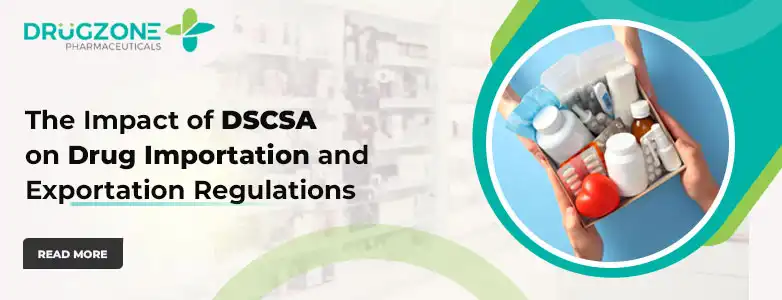
Posted On: April 23, 2025
How the DSCSA Shapes Drug Importation and Exportation Regulations
Global drug trade is undergoing rapid shifts and development. With the introduction of the DSCSA, drug wholesale distributors are now required to go beyond simple logistics and embrace a more transparent, traceable supply chain.
Whether you're importing or exporting, staying compliant isn't optional, it's essential.
Understanding the Impact of DSCSA on Drug Importation and Exportation Regulations
Here's what DSCSA means for distributors operating across borders.
1. Challenges in Aligning Importation Programs with DSCSA Requirements
Imported drugs often lack the specific tracking features mandated by the DSCSA.
For example, the DSCSA requires all prescription drugs in the U.S. to have standardized tracking mechanisms like serialized identifiers and scannable barcodes tied to National Drug Codes (NDCs).
However, many imported drugs don’t follow these same protocols because their countries of origin operate under different regulatory frameworks. This lack of harmonization makes it difficult to verify authenticity, trace product history, and maintain full compliance within the U.S. supply chain.
Without these data points, imported products can't seamlessly integrate into DSCSA-compliant systems, creating operational and legal complications for distributors.
2. Variability in State and Federal Importation Legislation
The DSCSA only allows transactions between authorized trading partners. Most foreign manufacturers and exporters aren't registered under U.S. systems, which creates legal and logistical obstacles for seamless importation.
Different states have enacted or proposed varying drug importation laws, leading to a fragmented regulatory scenario. This variability complicates the establishment of a cohesive national strategy that aligns with DSCSA provisions.
3. Potential Safety Concerns with Imported Medications
Under the DSCSA, every transfer of drug ownership in the U.S. must be accompanied by a complete “track-and-trace” record, known as the Transaction Information, History, and Statement (TI/TH/TS).
This detailed documentation helps verify the legitimacy of the drug as it moves through the supply chain. However, foreign exporters often lack systems that generate DSCSA-compliant records.
Without this paperwork, U.S. drug wholesale distributors legally cannot accept or distribute the products, which makes those imports essentially unusable in the regulated U.S. market. This creates a significant compliance hurdle for international transactions.
4. Impact on Drug Wholesale Distributors
To comply with DSCSA, drug wholesale distributors must deploy advanced digital tracking systems that trace each drug unit from origin to delivery. These systems must be interoperable and secure, aligning with both U.S. regulations and international protocols, and it's a complex and costly requirement.
In the case of imported drugs, the issue becomes more complex because they often aren’t linked to the U.S.-based recall and alert systems.
So, if a safety concern arises (like contamination or adverse effects) there may be delays in identifying and removing those drugs from circulation, thus putting patient health at greater risk.
5. Implications for Patient Access and Cost Savings
While drug importation aims to reduce costs and improve access, aligning these programs with DSCSA requirements may limit the range of eligible medications. This could affect the anticipated benefits for patients, and as a result, necessitate a careful balance between affordability and safety.
Handling the Impact
As a result, drug wholesale distributors must invest in advanced technology and streamlined systems to track and verify drugs through every step of the supply chain. This means adopting serialization and secure packaging solutions to meet DSCSA’s standards.
This added responsibility may increase operational complexity for drug wholesale distributors. However, it also ensures a more secure and transparent trade, thus protecting consumers and maintaining trust in the pharmaceutical industry.
Drugzone’s Role in DSCSA-Compliant Drug Distribution
Drugzone understands how complex drug import and export regulations can be, especially under DSCSA. As trusted drug wholesale distributors, we stay ahead of compliance requirements to ensure a secure and transparent supply chain.
If you're looking for a reliable partner who takes safety and traceability seriously, we’re here to help.
Frequently Asked Questions (FAQs)
Q. What is the DSCSA and how does it affect drug wholesale distributors?
The DSCSA mandates traceability in the drug supply chain, requiring wholesale distributors to verify and document every transaction to ensure drug safety.
Q. Are drug wholesale distributors allowed to import drugs under DSCSA regulations?
Yes, but they must ensure the drugs come from authorized sources and comply with serialization and documentation standards.
Q. How does DSCSA influence cross-border trade for drug wholesale distributors?
It imposes strict tracking and verification protocols, thus making international trade more transparent and secure against counterfeit drugs.
Tags
Latest Posts
Similar Posts
-

Top Challenges in Achieving DSCSA Interoperability
-

FDA’s Risk-Based Inspection Model: What It Means for You
-

FDA 483 and Warning Letters: What Pharma Companies Need to Know
-

The Role of DSCSA in Enhancing Drug Clinical Trials Regulations
-

PwC Report Highlights Transformative Trends in Pharma for 2025 and Beyond



